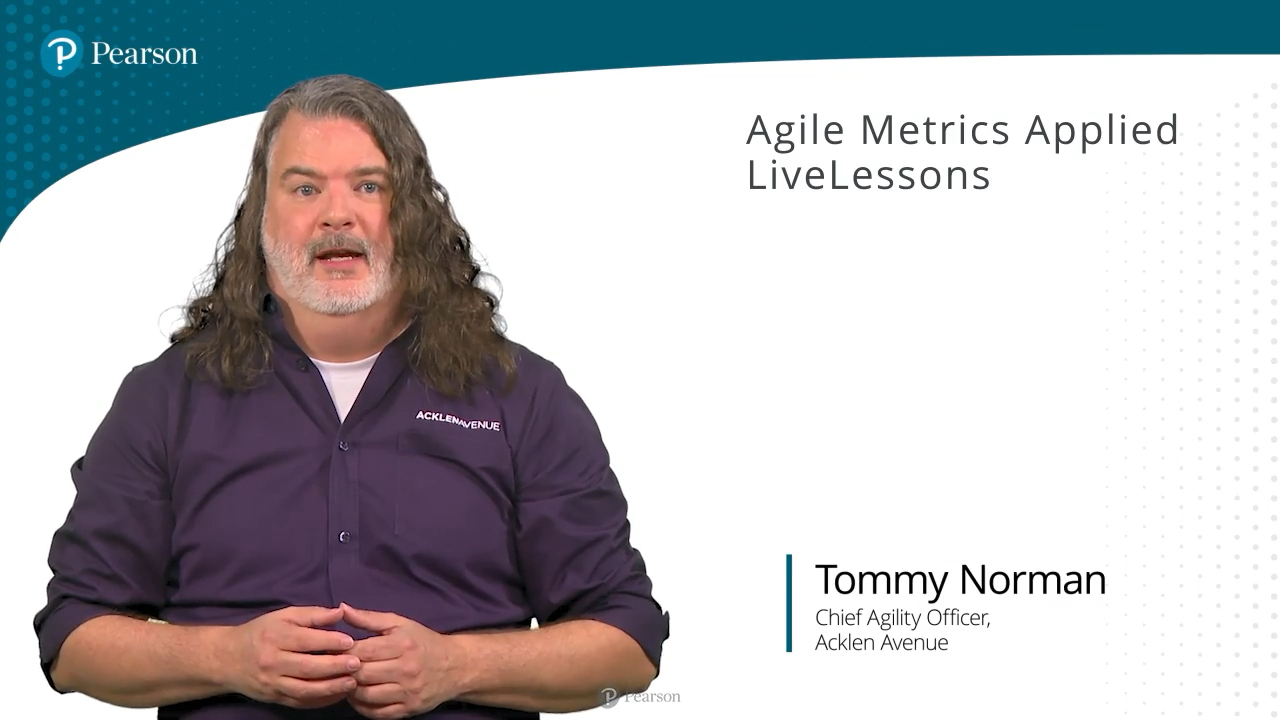Complete Agile Metrics and Planning: Video Collection
- By Tommy Norman
- Published Aug 1, 2024 by Addison-Wesley Professional.
Online Video
- Your Price: $279.99
- List Price: $349.99
- About this video
Video accessible from your Account page after purchase.
Register your product to gain access to bonus material or receive a coupon.
Description
- Copyright 2025
- Edition: 1st
- Online Video
- ISBN-10: 0-13-539745-6
- ISBN-13: 978-0-13-539745-9
8+ Hours of Video Instruction
This video collection shows how to measure Agile teams effectively and help create an environment that maximizes value and learning, while also leveraging the power of Agile estimating and planning to manage client and stakeholder expectations throughout every stage of software development.
Overview:
Complete Agile Metrics and Planning video collection is based on two video courses that give you everything you need to measure agile teams effectively and leverage the power of agile estimating and planning.
This master class includes the following courses:
- Agile Metrics Applied (Video Training)
- Agile Estimating and Planning: Managing Client and Stakeholder Expectations (Video Course)
Finding the right balance of metrics for your Agile teams can significantly help your continuous improvement efforts, forecasting, and risk management on software development projects. Instilling curiosity about performance data instead of dreading arbitrary performance goals is the best way to promote a culture of continuous improvement. Agile Metrics Applied (Video Training) will guide you through how best to incorporate metrics into your teams and organizations to diagnose issues, unearth trends, predict issues, and apply historical results to prescribe preventative actions. You will also learn multiple techniques and approaches for creating data visualizations that make your metric reporting clear and impactful.
Agile Estimating and Planning (Video Course) teaches you how to scope and estimate for a software project with minimal information, as well as how to use product visioning, personas/goals, and story mapping to ensure everyone understands the why, who, and what of the product they are building. You will explore strategies to maximize the Product Backlog's value and how to continually integrate new insights. You will discover how the Product Backlog influences the Release Plan and how it can surface early indicators that reveal the need for potential adjustments to scope and schedule. Finally, you will learn to assess the impact of deliverables on business outcomes and how to incorporate these lessons back into the Product Backlog.
Prerequisites:
- Basic understanding of Agile Software Development using a framework such as Scrum or Kanban.
About Pearson Video Training:
Pearson publishes expert-led video tutorials covering a wide selection of technology topics designed to teach you the skills you need to succeed. These professional and personal technology videos feature world-leading author instructors published by your trusted technology brands: Addison-Wesley, Cisco Press, Pearson IT Certification, Sams, and Que. Topics include IT Certification, Network Security, Cisco Technology, Programming, Web Development, Mobile Development, and more. Learn more about Pearson Video training at http://www.informit.com/video.
Sample Content
Table of Contents
Agile Metrics Applied
Introduction
Lesson 1: Why We Measure
1.1 How Metrics Correspond to Outcomes
1.2 How Metrics Influence Behaviour
Lesson 2: Defining a Metric
2.1 Qualities of a Good Metric
2.2 Creating a Metric Questionnaire
2.3 Common Metric Pitfalls
Lesson 3: Descriptive Data Analytics
3.1 Collecting Data
3.2 Visualizing Data
Lesson 4: Diagnostic Data Analysis
4.1 Investigating Why
4.2 Drilling Down in Detail
Lesson 5: Predictive Data Analytics
5.1 Measuring Variability
5.2 Forecasting with Empirical Data
5.3 Thresholds and Boundaries
Lesson 6: Prescriptive Data Analytics
6.1 Identifying Data Trends
6.2 Data Informed Guidance
Lesson 7: Creating a Balanced Dashboard
7.1 Setting Up Guardrails
7.2 Defining a Metrics Quadrant
7.3 Trending Dashboards
Lesson 8: Instilling a Culture of Continuous Improvement
8.1 Data-Driven Improvement
8.2 Avoiding a Culture of Fear
Lesson 9: Agile Metrics in Action
9.1 End-to-end Metrics Demo
Summary
--
Agile Estimating and Planning
Introduction
Lesson 1: When and How Much?
- What's Behind These Questions?
- Managing Expectations
- First Impressions
Lesson 2: Setting Initial Expectations
- Initial Discovery
- Breaking Down the Work
- Forecasting with Uncertainty
- Adding the Price Tag
- Communicating the Estimate
Lesson 3: Kicking Things Off
- Start with Why
- Solve the Problem
- Seed the Product Backlog
Lesson 4: The Estimation Game
- Estimates Are Horrible
- Focus On the Conversation
- The Actual Estimate
Lesson 5: The Art of Release Planning
- Determining Your Delivery Rate
- Determining Your Team Cost
- Creating the Release Plan
Lesson 6: Using Empirical Data
- Rolling with the Changes
- The Canary in the Coal Mine
- Adjusting the Release Plan
Lesson 7: Expectation Management
- Feedback Loops
- Ops Review Meetings
- Measuring Outcomes
Lesson 8: Implementation Guidance
- Real-World Examples
- Scaling This Approach
- Overcoming Fear
Summary
More Information

